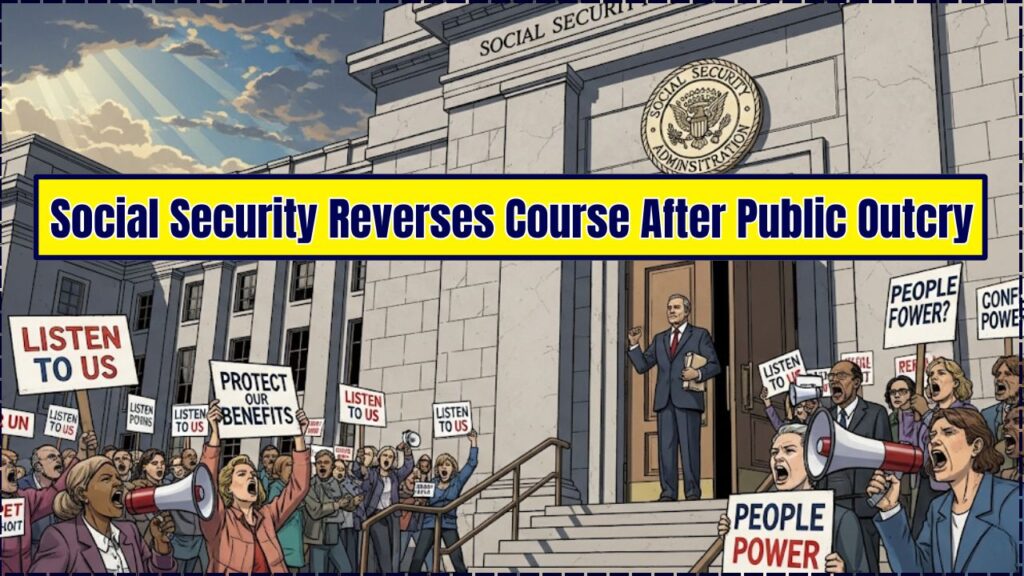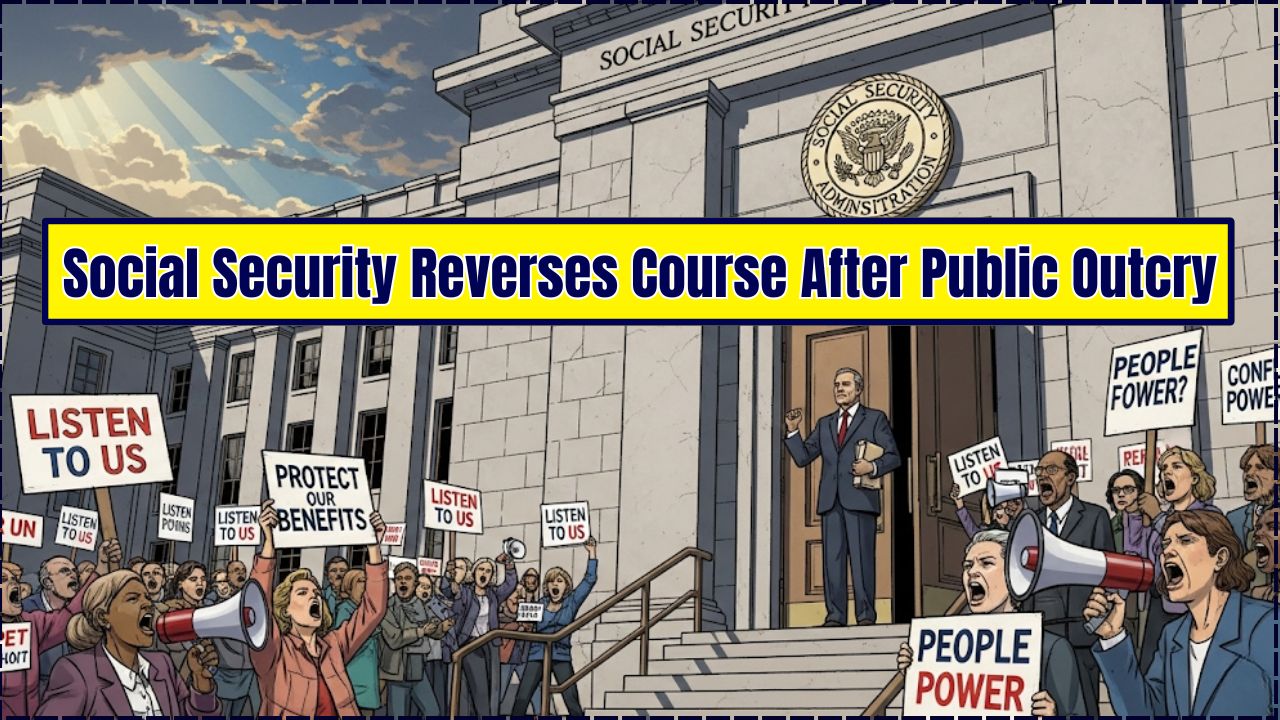Social Security plays a pivotal role in the financial well-being of millions of Americans. Whether you’re a retiree, a disabled individual, or a loved one of someone receiving benefits, it’s essential to keep up with the changes that can directly impact your life. Recently, the Social Security Administration (SSA) reversed course on several decisions after facing significant public outcry. Here’s what you need to know about the latest changes, how they affect you, and what steps you should take to stay ahead.

Social Security Reverses Course
| Key Changes | Details | Impact |
|---|---|---|
| PIN Requirement | The SSA initially planned to require all beneficiaries to obtain a new Personal Identification Number (PIN) for service access. Now, it’s optional. | Beneficiaries no longer need to worry about securing a new PIN to access their Social Security services. |
| Phone Services for Identity Verification | Phone services for identity verification were on the chopping block. Following backlash, the SSA has decided to allow all claim types to be processed over the phone. | Those needing identity verification can now do so over the phone, avoiding inconvenient office visits. |
| Paper Check Phase-Out | The SSA is phasing out paper checks by September 2025, moving to electronic payments like direct deposit. | Beneficiaries will need to switch to electronic payments to avoid delays or interruptions in their benefits. |
| Repeal of WEP and GPO | The Social Security Fairness Act repealed the Windfall Elimination Provision (WEP) and the Government Pension Offset (GPO), providing fairness to public sector workers. | Public employees like teachers, firefighters, and police officers will now receive full Social Security benefits. |
The recent reversals and changes by the Social Security Administration demonstrate their commitment to serving the public. Whether it’s making sure that accessing benefits is easier, ensuring that payments are faster and more secure, or correcting past policies that unfairly affected certain workers, these changes are steps in the right direction.
Understanding the Recent Reversals
The Social Security Administration’s recent moves came after widespread protests from advocacy groups, seniors, and the public at large. These reversals touch on several policies that, if implemented as originally planned, could have disrupted service for millions of people. Let’s break down what has changed.
1. Personal Identification Number (PIN) Requirement: The Reversal
Back in early 2025, the SSA announced a requirement for beneficiaries to secure a new Personal Identification Number (PIN) by August 18, 2025. The intention was to strengthen security. But, after backlash from senior citizens, disabled individuals, and advocacy organizations, the SSA made a u-turn. Now, securing a new PIN is optional.
For many, particularly seniors with limited access to the internet, the PIN system could have been a significant hurdle. The SSA heard the concerns and responded with a more flexible approach. Beneficiaries can still use other existing methods for authentication, such as their Social Security number or other personal information.
Example: Imagine a retiree named Clara, who lives in a rural area with limited internet access. The new PIN requirement would have been a challenge for her. After the reversal, she no longer needs to worry about learning how to access a new PIN.
This move reassures people that the SSA is committed to ensuring accessibility for those who may not be as tech-savvy or have easy access to digital resources.
2. Phone Services for Identity Verification: No More In-Person Visits
Another major policy shift was around identity verification. Earlier this year, the SSA had planned to remove phone services and require beneficiaries to visit field offices in person to verify their identity. This was set to begin on March 31, 2025. The public responded with frustration, particularly those living in rural areas where SSA offices are often far away.
After a series of complaints and concerns from individuals with disabilities and elderly people, the SSA reversed this decision. Now, beneficiaries can complete the identity verification process over the phone for various claims, including Retirement, SSDI, and SSI benefits.
Scenario: Take James, a 68-year-old Social Security beneficiary, who lives 50 miles away from the nearest SSA office. James was concerned about the new requirement to verify his identity in person. The reversal means he can now verify his identity over the phone, without the hassle of a long trip.
For some, this change is a lifesaver, particularly those who rely on phone service to conduct business due to physical disabilities or mobility challenges. However, if there is suspicion of fraud or any issues with identity verification, in-person verification will still be required.
3. The End of Paper Checks: What You Need to Know
In an effort to cut costs and reduce fraud, the SSA is moving to phase out paper checks entirely by September 30, 2025. This shift toward electronic payments, such as direct deposit or prepaid debit cards (Direct Express), is aimed at making the payment process more secure and efficient.
For anyone still receiving Social Security payments via paper checks, this will mean taking steps to switch to electronic payment methods. You’ll want to start planning ahead by setting up Direct Deposit with your bank or signing up for Direct Express, which is a prepaid debit card.
While some exceptions will be made for individuals who cannot access electronic banking, most beneficiaries will need to make this change soon to avoid delays in receiving their payments.
Fun Fact: According to the SSA, around 97% of Social Security beneficiaries already use direct deposit. This move to phase out paper checks is in line with an increasing trend toward electronic payments in both public and private sectors.
4. Social Security Fairness Act: A Win for Public Sector Workers
For decades, public sector workers like teachers, firefighters, and police officers faced reductions in their Social Security benefits due to the Windfall Elimination Provision (WEP) and the Government Pension Offset (GPO). These provisions reduced or eliminated Social Security benefits for those who had earned pensions from non-Social Security-covered jobs.
In January 2025, the Social Security Fairness Act was signed into law, repealing these provisions. The change means that public sector workers who paid into Social Security during their careers will now receive full benefits without penalties.
This repeal is a significant victory for many who were previously affected by the WEP and GPO. Public sector employees will now have the financial security they deserve after a lifetime of service to their communities.
Expert Insight: “The elimination of the WEP and GPO provisions is a victory for fairness,” says Amy McBain, a Social Security expert. “It levels the playing field for workers who served their communities in essential roles.”
FAQs
1. Why did Social Security reverse the PIN requirement?
The reversal came after widespread feedback that the mandatory PIN system would be difficult for many, particularly seniors and people with disabilities. The SSA decided to make the PIN optional to ensure that all beneficiaries, regardless of their technological skills, could still access essential services.
2. How do I change from paper checks to electronic payments?
You can switch to electronic payments by setting up Direct Deposit with your bank or applying for the Direct Express prepaid debit card. Visit the SSA’s website or call their helpline to make the switch.
3. What are the benefits of switching to electronic payments?
Electronic payments are faster, safer, and more efficient than paper checks. They also reduce the risk of fraud and help you receive your payments on time every month.
4. Will I still be able to verify my identity over the phone?
Yes! The SSA has reversed its decision to eliminate phone services for identity verification. Now, beneficiaries can verify their identity over the phone, avoiding the need to visit an office in person unless there’s a suspicion of fraud.
5. How do the changes affect public sector workers?
Public sector workers, like teachers and police officers, will now receive full Social Security benefits without reductions due to the repeal of the WEP and GPO. This means more financial security for those who were previously penalized.












